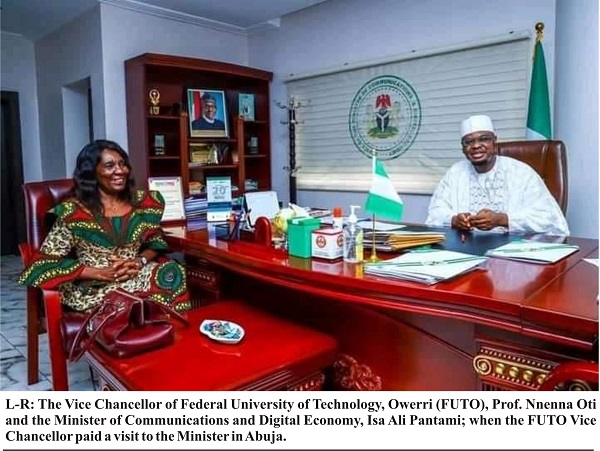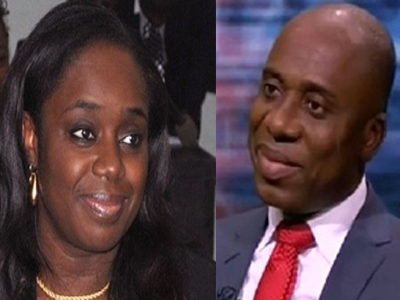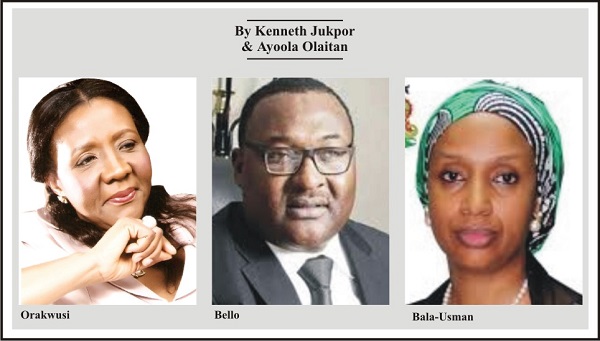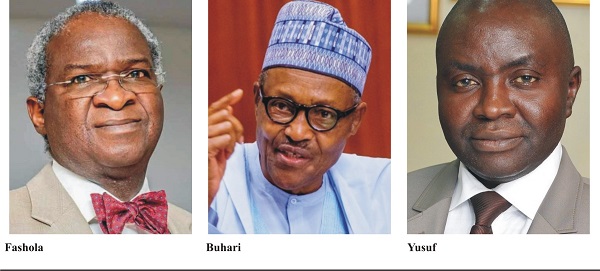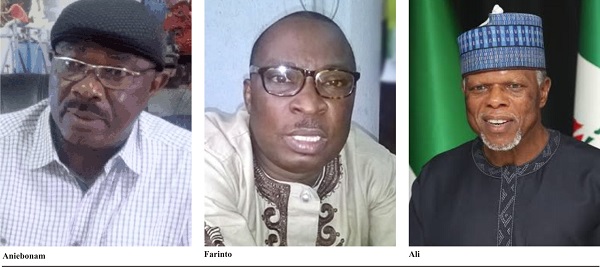Pantami’s FUTO Professorship: Intrigues And Politics
By Kenneth Jukpor
Controversies continue to trail the appointment of the Minister of Communications and Digital Economy, Isa Ali Pantami, as Professor of Cybersecurity by the Federal University of Technology, Owerri (FUTO), a development that has brought ridicule to the learning institution.
Lecturers affiliated with FUTO are embarrassed by this development; even as some professors have lamented that the publicity on the issue has shown that professorship is for sale in the country. ASUU as well as the FUTO Alumni are still investigating this issue at FUTO, which is regarded as one of the best universities of technology in Africa.
There are many intrigues on the issue, but the quagmire started when the Minister accepted the offer as a Professor of Cybersecurity in the School of Information and Communication Technology five months before the FUTO officially offered him the appointment.
While the FUTO offer of appointment with Ref: FUTO/REG/EST/SPAC/SP.6056 was written on August 20, 2021; Pantami’s letter of ‘Acceptance of an Appointment as a Professor of Cybersecurity’ was dated March 30, 2021.
On July 15, 2021, the Vice Chancellor of FUTO, Professor Nnenna Oti visited Isa Pantami in Abuja. Sources claim that this meeting was where the plans to offer Pantami Professorship were sealed.
Some of the complaints on Pantami’s qualification are; that Pantami was said to be an Associate Professor at the Islamic University of Madinah. However, Saudi Arabia’s university system is modelled after the American system, and the minimum number of years required to be promoted to an associate professor from an assistant professor is 5 years. Pantami was an assistant professor for only two years.
The National Information Technology Development Agency (NITDA), which Pantami was a Director-General of, has also been labeled a poor specimen of a research institute as claimed by FUTO as NITDA is a government agency.
According to the FUTO Registrar, J.U Nnabuihe, the University advertised the position of professor of Cybersecurity, along with other academic positions, in September 2020 and that Pantami applied for it and got it. This leaves more controversy as Pantami would have applied for an academic vacancy as a serving Minister, in violation of the terms of his current employment.
In a strange response during an interview with a national daily newspaper, the FUTO Registrar said that it is Pantami’s “business” whether or not he chooses to perform the duties of the vacancy he has filled! “He applied and FUTO has assessed and appointed him; it’s not my business if he comes here to teach and research,” he said.
Meanwhile, according to the Offer of Appointment signed by the same Registrar, Nnabuihe, Pantami’s duties will be teaching, research and such other duties as may be assigned by the Head, Department of CyberSecurity or his/her representative.
The letter also noted that Pantami will be placed on Consolidated University Academic SalaryStructure (CONUASS II) 7 Step 2 that is N5,249,996.00 per annum and the next increment due on October 1, 2021 provided he had served at least six months by that date.
“The appointment is subject to your passing a medical examination to be arranged by the University. The appointment is subject to the provisions of the Federal Universities of Technology Act, Cap, F. 23, Volume 7, Laws of the Federation of Nigeria, 2004 and also to the Regulations Governing the Conditions of Appointment of Senior Staff made by the University Governing Council from time to time. Your Personnel Number is SP.6056 and must be quoted in every official correspondence with the University,” the letter read in part.
Pantami also recently stated that he accepted the role of Professor of Cybersecurity based on the instruction of President Muhammadu Buhari.
“This decision is sequel to my briefing to the President of the Federal Republic of Nigeria on Friday 26th March, 2021 and his permission for me to go ahead and share my knowledge and experience in academia, which is a form of community service to our citizens,” Pantami said.
Speaking with MMS Plus on this issue, Prof. Innocent Ogwude who retired from FUTO having served for years at the Department of Transport Management Technology, explained the procedure for becoming a Professor.
“When you get a PhD you become a Lecturer 2, after three years you become Lecturer 1, three years later you become a Senior Lecturer. In another three years you become a Reader which is also called Associate-Professor. The truth is that we don’t have an Associate Professor in Nigeria. When you spend three years as a Reader you become a Professor. If you calculate the steps from Lecturer 1 to a Professor it takes about 15years but some people attain Professor in 12 years. However, it isn’t a guarantee that once you spend three years you will get promoted. Publications have to be done and the University has to agree that you have been teaching.”
“It is also important to note that not everyone in the Academic field is a lecturer. Some people are research fellows and they take the same steps. They call them Research Fellow 1, Reasearch Fellow 2, Principal Research Fellow and Research Professor. When you call them professor, people wouldn’t know that they are just Research Professors.
“I read the argument of several people on the Pantami scenario; but some of the issues aren’t what attracts a University teacher like me. We can’t tell the University who to employ and who not to employ. The critical thing is that there is a suspicion that Pantami appointment didn’t follow due process. Due process means that the University will establish a prima facie case. You bring three copies of your publications and send it to three external assessors. If the external assessors say that you have done enough work to become a Professor, then you’ll be a professor. If they had done that, the University would ignore whatever the public is saying,” Ogwude said.
He, however, noted that FUTO lecturers and alumni are embarrassed by the extent that an unfavourable comment being passed around concerning the university.
“It became very worrisome with the defense the Registrar tried to give and it left us in awe because his defense is a case of personal incompetence or are they guilty. I don’t really know what happened because I’m not there. Nevertheless, I’m very troubled because FUTO standard is very high and for people to have this information flying around is bad. FUTO has to provide a good defense for people to forgive them,” he added.
Worried by the development, FUTO alumni also wrote to the institution to demand an explanation on Pantami’s professorship and the recent damaging articles against the Institution.
The association, in its letter signed by the National President, Ndubuisi Chijioke and forwarded to FUTO, expressed serious regret over an embarrassing article tagged FUTO – “Fraudsters University of Technology Owerri” targeted at destroying the reputation and image of their Alma mater.
He said that the association, rising from its NEC meeting on September 12, 2021, resolved to write to the university on the subject matter which was promptly done and by September 15, 2021, the letter from the Alumni was received by the university though without any response yet.
The National President said that the association’s locus standi to ask the questions was grounded on the facts that the Alumni body is a key stakeholder in the university enterprise, while more legally, “the FOI Act permits the Alumni to ask for any information from a public institution or public servant regarding the operations, processes and decisions of such public institution.
“The Act is a law that requires full compliance by responsible parties and we, therefore, expect the university to respond to the 12 questions we have raised,” Chijoke stressed.
Chijioke pointed out that “providing these answers to the question should form the basis for further engagement, investigation or outright determination of what transpired and what options and pathway to follow to remedy this ugly situation.”
According to him, the university’s response would enable the association to determine “if this was a case of an individual or collective failure by the Governing Council or sheer negligence in their fiduciary responsibilities or a case of impunity by the chief executive of the university.
The national president said that the university’s response would enable the Alumni to determine how to approach or progress further action.
He said: “FOI Act specifically requires the public institution to respond within 7 days to any request made to it. By the 22nd, it will be exactly 7 days after the University received our request. Failing to provide a response by the 22nd can only mean three things: 1) it has failed the first test on accountability and transparency. 2) It has defied an extant law requiring it to avail such information on request. 3) It sadly has something to hide about this action that has attracted general public opprobrium.”
Chijioke said that if the Alumni did not receive a response by the said date, after having given the University Management the opportunity to clarify itself, “it will then be appropriate to draw inference from the information available to the Alumni and then take further action”.
He said that the association “will take further actions which include a public statement updating the Alumni community on the actions so far and the no-response from the university as well as compel the university to provide the records and proceedings leading to this decision.”
He, therefore, urged all members to patiently wait for the seven days the law has granted the University to respond, adding that if they failed to respond, the association would be acting within the law to proceed with our next further action.
The national president pointed out that their letter asked questions which are: “To provide to FUTO Alumni Association National Executive Council the records of the proceedings of the University Governing Council meeting at which this appointment was made. To know the register of the Council members in attendance at the time this appointment was approved. The extant university and Nigerian University Commission’s procedure for the appointment of professors. Details of the advert for this professorial position. Details of the application(s) received for this position.”
Others are: “Details of the academic publications by Pantami on which basis he was examined and offered this appointment; details of all other publications by Pantami and the resume of Mr. Pantami submitted in support of his application which details his academic records and work experience in the academia.
The association also demanded; the names of the examiners appointed and responsible for the assessments of Ibrahim Pantami’s application and publications for the purpose of this appointment/promotion; the resume of all the professorial examiners of Pantami for the purpose of this appointment; the report of the assessment by the professorial examiners of Pantami and any other information, documents or records considered relevant and useful on this subject matter.
Nevertheless, the university declined to provide the requested information on the grounds that the Alumni is not a stakeholder in the University and therefore not qualified to request the said information, adding that the University Governing Council decisions are classified matters and covered by the Official Secrets Act.
In another meeting, the Vice-Chancellor took time to explain the process and the procedure followed by the University for the appointment of Dr Isa Ibrahim as a Professor, which she said conformed with the extant rules and regulations laid down for such appointments, in the establishment of the Prima Facie case for his appointment and was quick to note that the process started with the immediate past Administration and the 11th Governing Council.
According to Prof. Nnenna, she inherited it and only handled the last phase which is the presentation of those whose papers have returned positive to the 12th Governing Council for ratification and Dr Isa Ibrahim happened to be one of them.
From her argument, the major take away borders on the establishment of a Prima Facie case. This particular process coupled with papers returning ‘positive’ were all concluded with the last administration. The roles of the current administration and 12th Governing Council were mere formality.
There are indications that some aspects of the process were breached especially within the process leading to the establishment of the Prima Facie case.
Academic Staff Union of Universities (ASUU) FUTO has set up a Panel to look into the matter to determine the extent to which the process was flawed and report back.
ASUU, whose members understand the process, methodology and intricate nature of where the process may be breached, is in a better position to do a more thorough job. Perhaps, all arsenals should be directed in restoring the image of the University while the investigation tarries.
The development has already had an effect on the academia at other institutions as Prof. Bamidele Badejo of the Department of Geography, Faculty of Social Sciences, Olabisi Onabanjo University, Ogun State, recently stated that professorship may be for sale in the country.
Prof. Badejo made this remark during a conference organized by the Chartered Institute of Environmental and Public Health Management of Nigeria (CIEPHMN) in collaboration with Maritime Reporters’ Association of Nigeria (MARAN) at the Lagos Airport Hotel, Ikeja.

